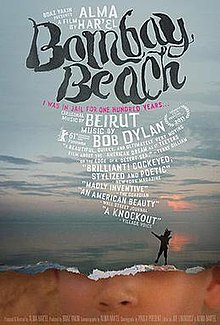Bombay Beach (film)
| Bombay Beach | |
|---|---|

Film poster
|
|
| Directed by | Alma Har'el |
| Produced by |
Alma Har'el Boaz Yakin Rafael Marmor |
| Music by |
Zach Condon Bob Dylan (songs) |
| Cinematography | Alma Har'el |
| Edited by | Alma Har'el and Joe Lindquist |
|
Release date
|
|
| Country | United States |
| Language | English |
Bombay Beach is a 2011 documentary film directed and produced by Israeli filmmaker Alma Har'el. The film was nominated for an Independent Spirit "Truer than Fiction" Award, won "Best Feature Documentary" at the 2011 Tribeca Film Festival, and has been taught in several universities including Harvard’s Sensory Ethnography Lab and Film Center as a genre redefining work. Taking place in the Salton Sea, a rusting relic of a failed 1950s development boom, Bombay Beach is a dreamlike poem that sets three personal stories to a stylized melding of observational documentary and choreographed dance to music specially composed for the film by Zach Condon of the band Beirut, and songs by Bob Dylan.
Filmmaker Terry Gilliam called the film, "A beautiful, quirky, and ultimately very moving film about the American Dream on the edge of a desert sea."
The film uses an adamantly atypical and artistically innovative filmmaking to tell the story of three protagonists: Benny Parrish, a young boy diagnosed with bipolar disorder whose troubled soul and vivid imagination create both suffering and joy for him and his complex and loving family. "CeeJay" Cedric Thompson, a black teenager and aspiring football player who has taken refuge in Bombay Beach hoping to avoid the same fate of his cousin who was murdered by a gang of youths in Los Angeles. And that of Red, an ancient survivor, once an oil field worker, living on the fumes of whiskey, cigarettes and an irrepressible love of life. Together they make up a triptych of American manhood in its decisive moments, populating the Salton Sea's land of thwarted opportunity. The New York Times writes, “[Bombay Beach] feels like a fever dream about an alternate universe. Suffused with a sense of wonder, it hovers, dancing inside its own ethereal bubble.”
Har’el explains about the film, “This film can only serve to show glimpses into some of the larger issues one can pick out from these people’s lives and the way in which they live their lives in this particular place. All these things that can be perceived as wrong or right, or bad or good, all reside together, side by side. This is the human experience of life and that’s what I wanted to illustrate more than anything, how things co-exist, all the wrongs and the rights together, the love and the violence, the broken dream and the persistence of dreams. Even though the dream is broken, you can still see the people”
...
Wikipedia
